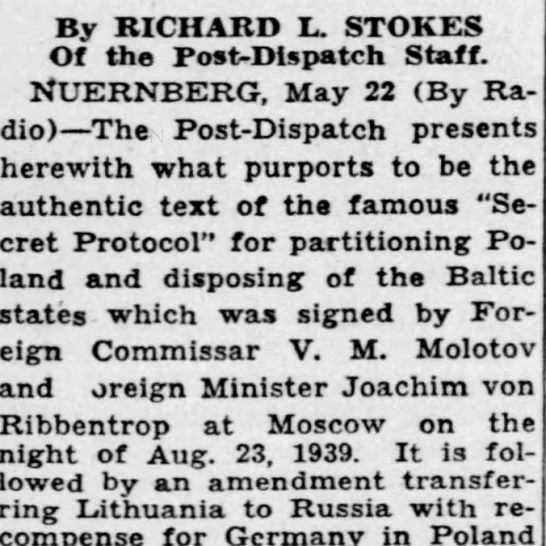
Historian: UW-Madison; Author of Soviet Judgment at Nuremberg, https://t.co/SLtPkk4Hne
How to get URL link on X (Twitter) App


 Lots of great examples of what not to do.
Lots of great examples of what not to do. 
https://twitter.com/pravda_eng/status/1533436956499234817Russian news sources proclaim that "this public trial will be watched by the whole world." And that "it will be a kind of mini-Nuremberg. trial of Ukrainian and European Nazism."

 Zorya’s death was reported to Moscow as a suicide. In Nuremberg, the Soviets put forward another story: Zorya had accidentally shot himself while cleaning his gun.
Zorya’s death was reported to Moscow as a suicide. In Nuremberg, the Soviets put forward another story: Zorya had accidentally shot himself while cleaning his gun.

 Stokes explained that this “purports to be the authentic text of the famous ‘Secret Protocol’ for partitioning Poland and disposing of the Baltic states which was signed by Foreign Commissar V. M. Molotov and Foreign Minister Joachim von Ribbentrop at Moscow on... Aug. 23, 1939.”
Stokes explained that this “purports to be the authentic text of the famous ‘Secret Protocol’ for partitioning Poland and disposing of the Baltic states which was signed by Foreign Commissar V. M. Molotov and Foreign Minister Joachim von Ribbentrop at Moscow on... Aug. 23, 1939.”

 Hadn’t Raeder known in 1940 that Hitler was planning to attack Russia? Pokrovsky began. No, Raeder responded. Hitler had not said that he wanted to go to war, just that the German military must “be prepared.”
Hadn’t Raeder known in 1940 that Hitler was planning to attack Russia? Pokrovsky began. No, Raeder responded. Hitler had not said that he wanted to go to war, just that the German military must “be prepared.”

 The Nuremberg judges and prosecutors were joined by other international law experts, like Romanian jurist Vespasian Pella, who had come to Nuremberg expressly for the occasion. The attendees discussed the postwar peace and the creation of a new organization of criminologists.
The Nuremberg judges and prosecutors were joined by other international law experts, like Romanian jurist Vespasian Pella, who had come to Nuremberg expressly for the occasion. The attendees discussed the postwar peace and the creation of a new organization of criminologists.